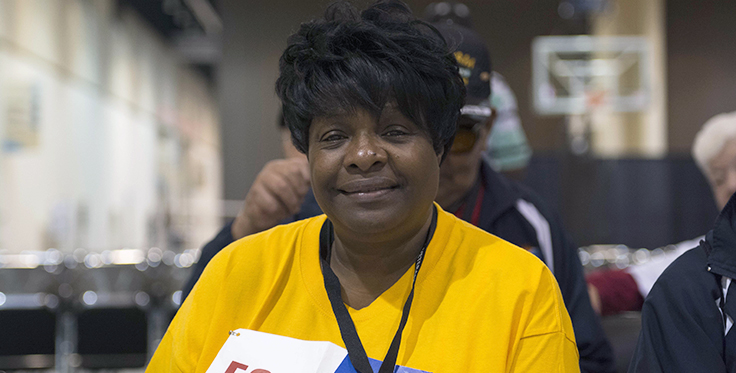Joe Ann McBride was slowly going blind and didn’t know it.
After serving in the Navy from 1983 to 1987, she took a job as a secretary for a construction company and never went to VA for her health care. But her vision kept getting worse. It forced her to retire early, and McBride went to VA for the first time at 56 to get some eyeglasses.
“Never thought of going there before,” she said. “My doctor said we should do a full

Navy Veteran Joe Ann McBride is one of nearly 800 Veterans competing in the National Veterans Golden Age Games in Biloxi, Mississippi. She says VA’s blind rehabilitation and sports programs have kept her active and social despite her vision loss.
check-up, and that’s when they found out how sick I was and had full-blown diabetes. It was out of control and my other doctors never caught it.”
Now 62, she can only make out shapes and a couple colors, but she’s competing for the fourth year in a row at the National Veterans Golden Age Games, taking place this year in Biloxi, Mississippi. McBride is in four events: visually-impaired bowling, boccia, power walking and blind discus golf.
If not for those VA doctors, she said, she’d be sitting in her house, depressed, scared and angry.
“I wouldn’t be here without VA. They changed my life,” said McBride, who gets her care at the Carl Vinson VA Medical Center in Dublin, Georgia. “They sent me to blind rehab for three months and taught me how to live with my blindness and get me out and doing things. I was a very socially active person before this, and didn’t know what I was going to do.”
That’s when her recreation therapist, Charlene James, stepped in.
“You’re going to the Golden Age Games,” James said.
“How am I going to do that when I can barely see?” McBride snapped.
“You’ll do it,” James said.
“And then she said, ‘It’s in Buffalo, New York,’ and I said, ‘How am I going to get around in the airport if I’m blind?”
“You’ll do it,” James said.
“And you know what? I did,” McBride said. “So many people are around to help you succeed. Through VA I can do everything. It was scary; so, so scary. Now I’m not afraid of anything.”
McBride said the three months she spent in blind rehabilitation taught her everything, even how to cook without seeing the stove.
“I never knew the two outer dials on the stove are for the front burners. Nobody knows that. These are things you take for granted when you can see. They taught me all the technical stuff and how to live, and have been a wonderful source of support.”
Playing blind at the Games takes more skill, she said, because it’s all about listening to the coaches and being aware of the game.
“For shuffleboard, the coach will step up and say, ‘OK, your opponent has you blocked at block 8,’ or he’ll tell you to throw a little harder or softer. It’s all about the feel. That first time I played and won, I was so excited. I start yelling, ‘Yes! Yes! I can still do things!’ But bowling? I have to work on that one. Sometimes that gutter just calls my name.”
One of her coaches, Greg Rogers, said McBride inspires others just getting into the program.
“To see her five years ago and to see her now, is just amazing,” he said. “She went from the timid stage to now she’s a lion. She’s meeting her goals, and proving to herself she can do this. She’s like another coach on the team for the other veterans, and her enthusiasm rubs off on everyone else.
“As a recreation therapist, this is what it’s all about,” Rogers said. “It helps get people through the depression and they get better without medication. That’s our goal – to do these things and get well without taking a pill.”
But McBride isn’t content to just play here.
“Would you believe, they even got me out to the Winter Sports Clinic and got me skiing?” she asked with a laugh. “I have never skied in my life, and oh my, it was so much fun!
“Since then, I’ve done rock climbing, kayaking, curling and even ice hockey. We got to go to a pro hockey rink and got all suited up. The guy teaching us, he said, ‘You know you’re in the game when you get knocked down on the ice and you get back up.’ Well, I was about ready to hit the puck, had my stick and got hit and knocked down.
“Then I was excited! I got up and yelled, ‘I’m in the game! I’m in the game!’”
Topics in this story
More Stories
The Medical Foster Home program offers Veterans an alternative to nursing homes.
Watch the Under Secretary for Health and a panel of experts discuss VA Health Connect tele-emergency care.
The 2024 National Veteran Suicide Prevention Annual Report provides the foundation for VA’s suicide prevention programs and initiatives.






